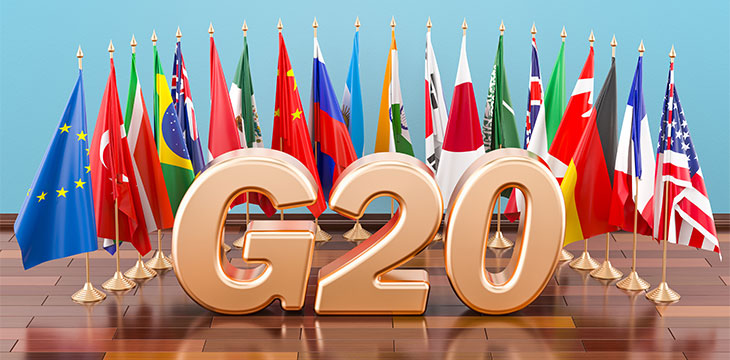|
Getting your Trinity Audio player ready...
|
Members of the G20 international forum have signed a joint declaration that establishes, among other things, the adoption of regulations for cryptocurrencies, in line with standards set forth by the Financial Action Task Force (FATF).
Various media outlets reported that the statement was signed at the conclusion of G20 talks during the weekend, in which concerns such as climate change, sustainable development, gender equality, and movement of refugees were also addressed.
Part of the document read, “An open and resilient financial system, grounded in agreed international standards, is crucial to support sustainable growth… We will regulate crypto-assets for anti-money laundering and countering the financing of terrorism in line with FATF standards and we will consider other responses as needed.”
Related to this, the G20 nations also committed to “continue to work together to seek a consensus based solution to address the impacts of the digitalization of the economy on the international tax system with an update in 2019 and a final report by 2020.”
The FATF consists of 37 member nations. Last October it had set the requiring of its standards to be applied in jurisdictions by June of next year. Under these regulations, cryptocurrency-related entities such as wallet providers, cryptocurrency exchanges, and those holding initial coin offerings (ICOs) will be required to conduct customer due diligence, which includes monitoring and reporting of transactions deemed suspicious.
Countries that fail to meet such standards, as determined by the task force’s periodic reviews, risk being placed in its blacklist.
The G20 includes the European Union (EU) and 19 countries, most of which are represented in the FATF as well, including Argentina, Australia, Japan, the UK, and the U.S.
Reacting to G20’s latest declaration, Bobby Lee, co-founder of the BTCC exchange, tweeted that “national governments are slowly but surely losing their monopoly and ability to issue fiat money.”
I wonder if @G20org World Leaders actually realize that they DO face a REAL Common Enemy now? 🤔
With #Bitcoin soon turning 10, national gov’ts are SLOWLY but SURELY losing their #monopoly & ability to issue (#fiat) money. It’s slow at first but this #revolution is irreversible! pic.twitter.com/Z62gJFouYo
— Bobby Lee – Ballet: World's EASIEST Cold Storage! (@bobbyclee) December 2, 2018
In connection with pronouncements and actions by the FATF and G20, individual countries such as Japan and Thailand, as well as individual U.S. states, are already pursuing their own financial reforms taking into account cryptocurrency markets and blockchain technology.

 02-28-2026
02-28-2026 




